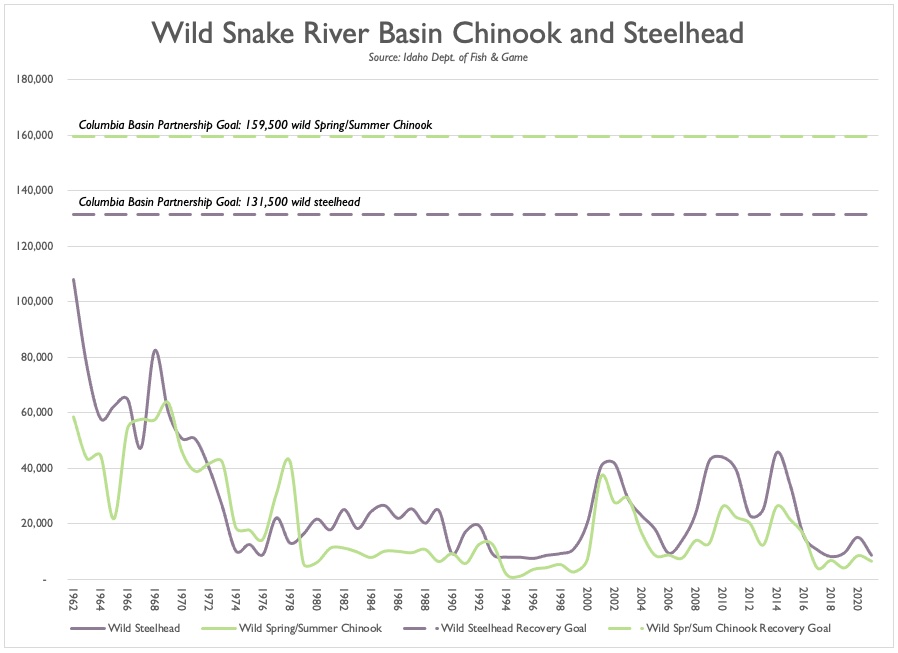forum
library
tutorial
contact

Feds Plan Dam
Listening Session
by Eric Barker
Lewiston Tribune, March 18, 2023
|
the film forum library tutorial contact |

|
Feds Plan Dam
by Eric Barker
|
In October 2021 the parties asked Judge Michal Simon for a stay so they could
enter mediation and seek a durable and long-term strategy to recover the fish.
 The Biden Administration wants to know what the public thinks about breaching the Snake River dams.
The Biden Administration wants to know what the public thinks about breaching the Snake River dams.
Sort of.
It will hold a "U.S. Government public listening" session via webinar at 10 a.m. on March 31 and is billing it as a chance for people, who are not party to a long-running federal lawsuit centered on Snake River salmon and federal dams in the Columbia River basin, to weigh in.
But thus far the administration hasn't publicized the session and federal officials did not respond this week to the Tribune's requests for information. Instead, it has left it to participants in the legal proceedings to announce the online meeting.
The parties to that lawsuit that include the federal government and defendant intervenors on one side and the Nez Perce Tribe, Oregon and fishing and environmental groups on the other have been in closed-door mediation for more than a year and have until this summer to reach an agreement.
The legal wrangling, carried out in iterations, is more than two decades old and spans several administrations. In short, the plaintiffs, who want four federal dams on the Snake River in Washington to be breached, have repeatedly challenged the government's plan that attempts to balance operation of the dams with efforts to save four runs of salmon and steelhead protected by the Endangered Species Act from blinking out.
The federal government has spent an estimated $17 billion trying to recover wild Snake River sockeye, spring chinook, steelhead and fall chinook. The fish spawn in high elevation lakes, streams and rivers in central Idaho, and parts of eastern Oregon and Washington. Their offspring migrate to the ocean, passing through the four Snake River dams and four more on the Columbia only to return one to three years later to spawn.
The government has tried to help them by improving damaged habitat, reforming hatcheries and harvest and making tweeks at the dams. But it has resisted calls for breaching that would end tug-and-barge shipping of commodities like wheat between Lewiston and downriver ports and eliminate hydroelectricity produced at the dams.
Judges have repeatedly sided with the Nez Perce, Oregon and the fish advocates and ruled multiple versions of the government's fish and dams plan arbitrary and capricious.
In October 2021 the parties asked Judge Michal Simon of Portland, Ore., for a stay so they could enter mediation and seek a durable and long-term strategy to recover the fish. That stay was extended by one year last August.
Most administrations have backed federal agencies that have said breaching would help the fish but is not needed. The Biden administration has been more open to the idea and said it is seeking a course change on Snake River salmon recovery. Last summer it said in a draft report that wild Snake River salmon and steelhead could not be recovered to harvestable levels without dam breaching.
"Put those two together and it's obvious they need to change path toward dam removal but the politics are extremely complicated," said Miles Johnson, legal director for the Columbia RiverKeeper, an environmental group based in Oregon. "I think they are grappling with that and they are going to have to make a decision here pretty soon in principle about which way they are going."
Johnson's organization is promoting the listening session as a way for its followers to be heard. But he and others privy to the mediation are forbidden by court order from talking about what has occurred at the mediation table. Johnson said he doesn't know if the administration will back breaching.
Justin Hayes, executive director of the Idaho Conservation League at Boise, said the listening session is a way for the administration to make sure it hears a diversity of voices.
"They have made it really clear they understand the status quo is not working. I think the question is what changes will they be proposing and what timeline will they be proposing them on," he said. "I think it's clear to everyone the status quo is not working for any interest and change is coming and this administration is going to be part of making that happen."
Kurt Miller, executive director of Northwest River Partners that represents nonprofit, community-owned utilities in the Pacific Northwest and opposes breaching, thinks the administration should be more open about the listening session and what it hopes to accomplish. The effort thus far contrasts sharply with other efforts by the federal government to collect public comment on salmon and dams.
"It just doesn't seem adequate or professional given what all is at stake," he said. "I find almost every aspect of this process disappointing."
People can register for the listening session at bit.ly/3lhrh4R.
learn more on topics covered in the film
see the video
read the script
learn the songs
discussion forum
